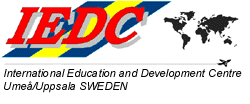By Dan Klepal
FLORIDA TODAY
PORT ST JOHN – Teachers from Sweden are visiting Enterprise Elementary school this
week, hoping to make the globe a little smaller and a lot greener.
The high school and college instructors are learning about a program called Global
Learning and Observations to Benefit the Environrnent, or GLOBE. It is a program started
by Vice President Al Gore that now is taught at 5,000 schools in 70 countries,
from Argentina to Uruguay.
The idea of the program is to have a worldwide network of primary and secondary students
making observations about their small slices of the world, then reporting those findings
over the Internet, where adult scientists analyze the data.
Dr. Eilert Hornberg, managing director of the International Education and
Development Centre in Umea/Uppsala, Sweden, said he hopes 'the teachers from his country
who are visiting Florida will spread the word about GLOBE and become certified GLOBE
instructors.
"It is a new approach," Hornberg said. "It's a way of letting children see
for themselves how to check the factors in their environment and the consequences of
change. It's a wonderful way to learn."
Five schools in Brevard County have GLOBE instructors - Eau Gallie High
School, Cape View Elementary, Meadowlane Elementary, Indialantic Elementary and Enterprise
Elementary. Brenda Dibler, a fourth-grade teacher at Enterprise and a trainer for GLOBE at
the University of Central Florida, said GLOBE studies can be applied to many curricula
math, science and social studies.
Dibler's students have performed experiments, such as testing pH the degree of acidity or
alkalinity in ponds, evaluating cloud cover and calculating tree height by using data
about the tree's diameter.
"The children become scientists," Dibler said. "It's a way of
bringing the world of science and math close to them in a meaningful way. Then real
scientists use the data for their own research."
GLOBE studies include:
- Atmosphere/climate: Measuring air temperature, cloud cover and precipitation.
- Hydrology: Measuring surface water temperatures, wather chemistry and transparency.
- Soils: Measuring moisture, temperature and characterization.
- Land cover: Measuring the extent of canopy and ground cover, tree height and species
identification.
Dibler said the students in different countries talk over the Internet so they learn
about different cultures and customs.
Staffan Hornberg, who is vice president of IEDC, said his country faces many,
of the same problems as the United States - spiraling growth, pollution, species
extinction and the need for conservation. "The most important thing we can take home
is the inspiration," Staffan Homberg said. "We all have the same problems, so
getting children involved in those discussions is very important."
